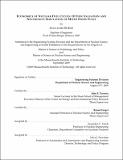Economics of nuclear fuel cycles : option valuation and neutronics simulation of mixed oxide fuels
Author(s)
De Roo, Guillaume
DownloadFull printable version (2.193Mb)
Other Contributors
Massachusetts Institute of Technology. Dept. of Nuclear Science and Engineering.
Advisor
John E. Parsons and Benoit Forget.
Terms of use
Metadata
Show full item recordAbstract
In most studies aiming at the economic assessment of nuclear fuel cycles, a primary concern is to keep scenarios economically comparable. For Uranium Oxide (UOX) and Mixed Oxide (MOX) fuels, a traditional way to achieve this is to evaluate both fuels on the deterministic premise that the fuel will be sent to geologic disposal once spent. This methodology often leads to higher costs for cycles using MOX fuel. Geologic disposal is not the sole possible ending for spent LightWater Reactor (LWR) fuel. Fast Reactors (FRs), which feed on transuranics (TRUs) extracted from LWR spent fuel, are seriously considered as a future technology. If it is cheaper to extract TRUs from spent MOX than from UOX, then the relative cost of a fuel cycle using MOX fuel may be less than in the case of their geologic disposal. However, the commercial development of FR cycles is uncertain. The value of UOX and MOX is therefore not the deterministic value in case of geologic disposal or in case of reprocessing into FRs. This thesis develops a method to assess the cost of thermal reactor fuel cycles in the presence of uncertainties in back-end management. The representation of future progress in FR technology through a resulting value of TRUs exhibits the properties of MOX as a financial option on the marginal TRU extraction cost. The framework establishes a significant modification of the back-end costs for countries using MOX, compared to traditional valuations. However, these savings do not completely offset the higher costs of recycling in the reference case.
Description
Thesis (S.M. in Technology and Policy)--Massachusetts Institute of Technology, Engineering Systems Division, Technology and Policy Program; and, (S.M.)--Massachusetts Institute of Technology, Dept. of Nuclear Science and Engineering, 2009. This electronic version was submitted by the student author. The certified thesis is available in the Institute Archives and Special Collections. Cataloged from student submitted PDF version of thesis. Includes bibliographical references (p. 71-73).
Date issued
2009Department
Massachusetts Institute of Technology. Department of Nuclear Science and Engineering; Massachusetts Institute of Technology. Engineering Systems Division; Technology and Policy ProgramPublisher
Massachusetts Institute of Technology
Keywords
Engineering Systems Division., Technology and Policy Program., Nuclear Science and Engineering.